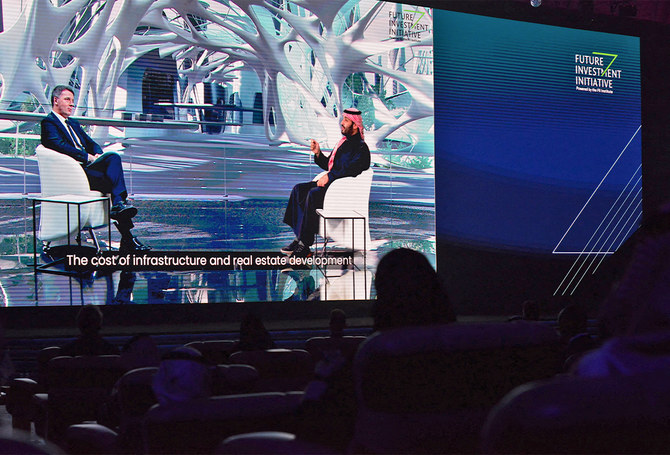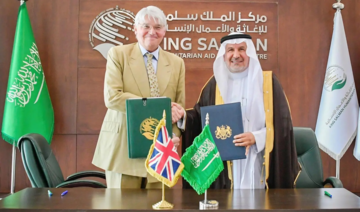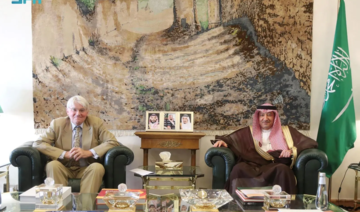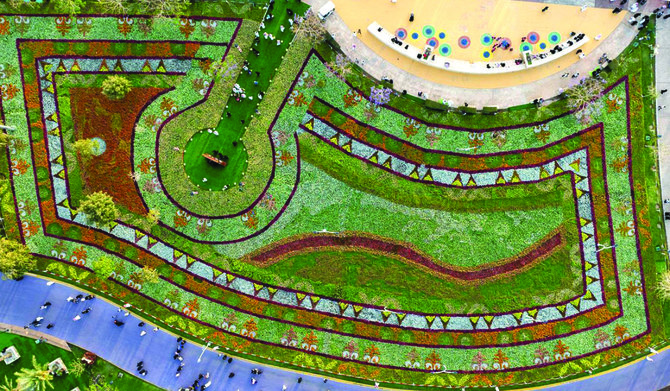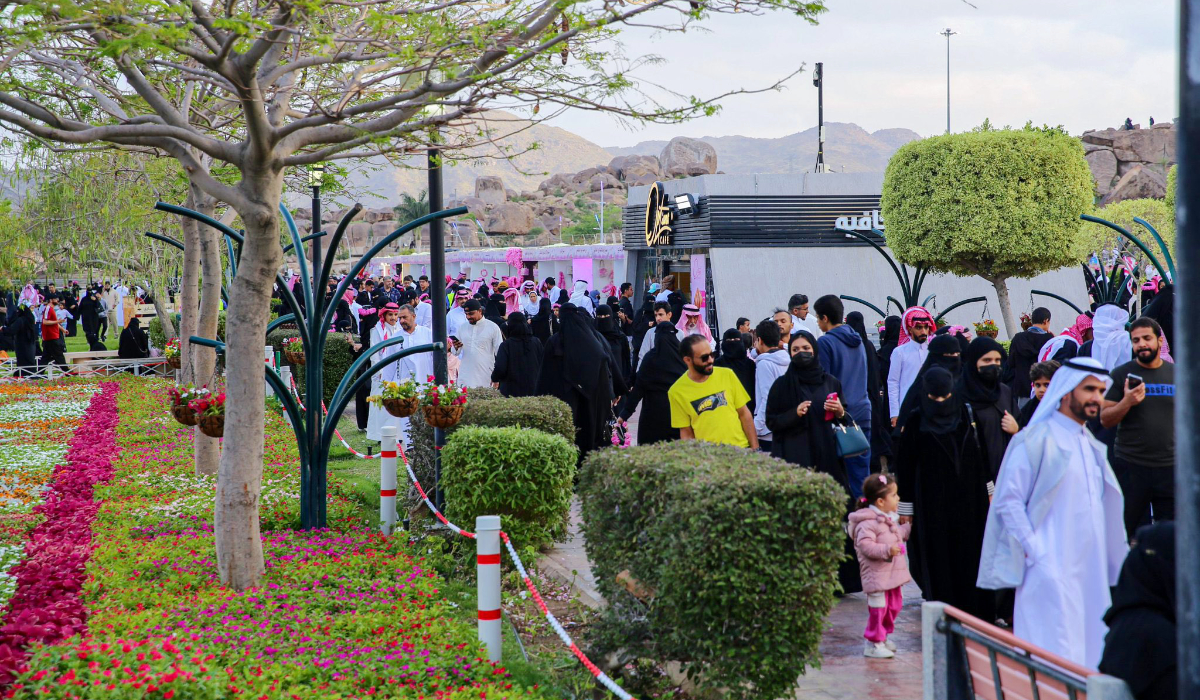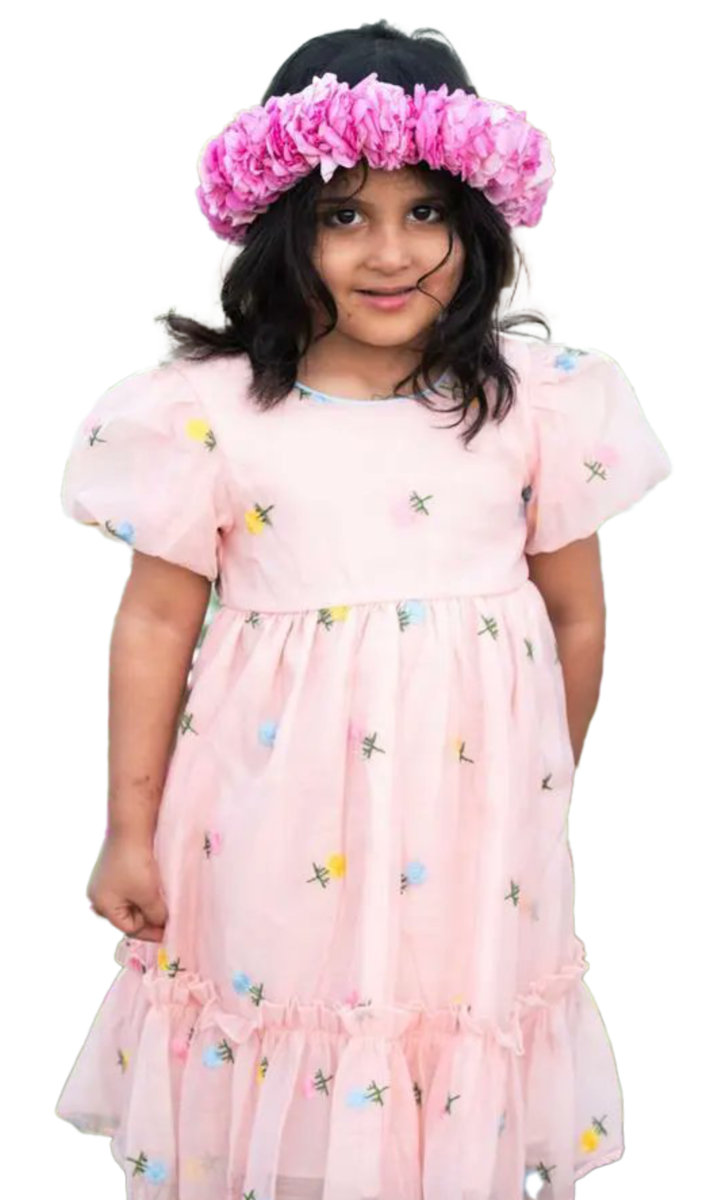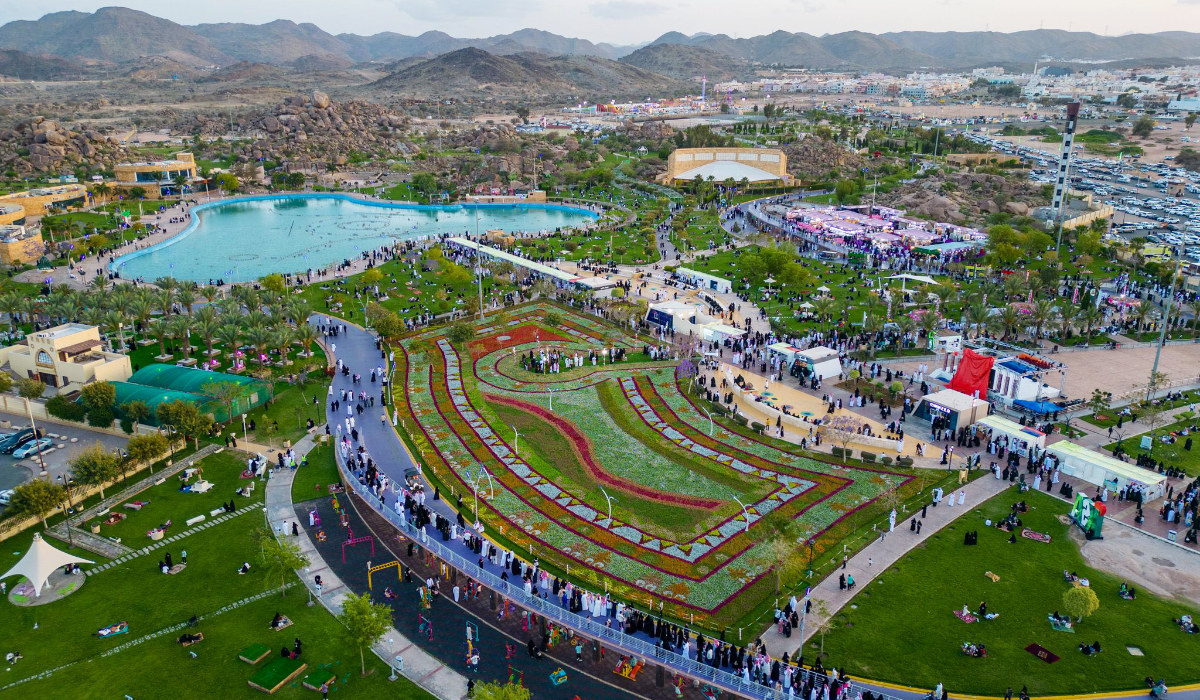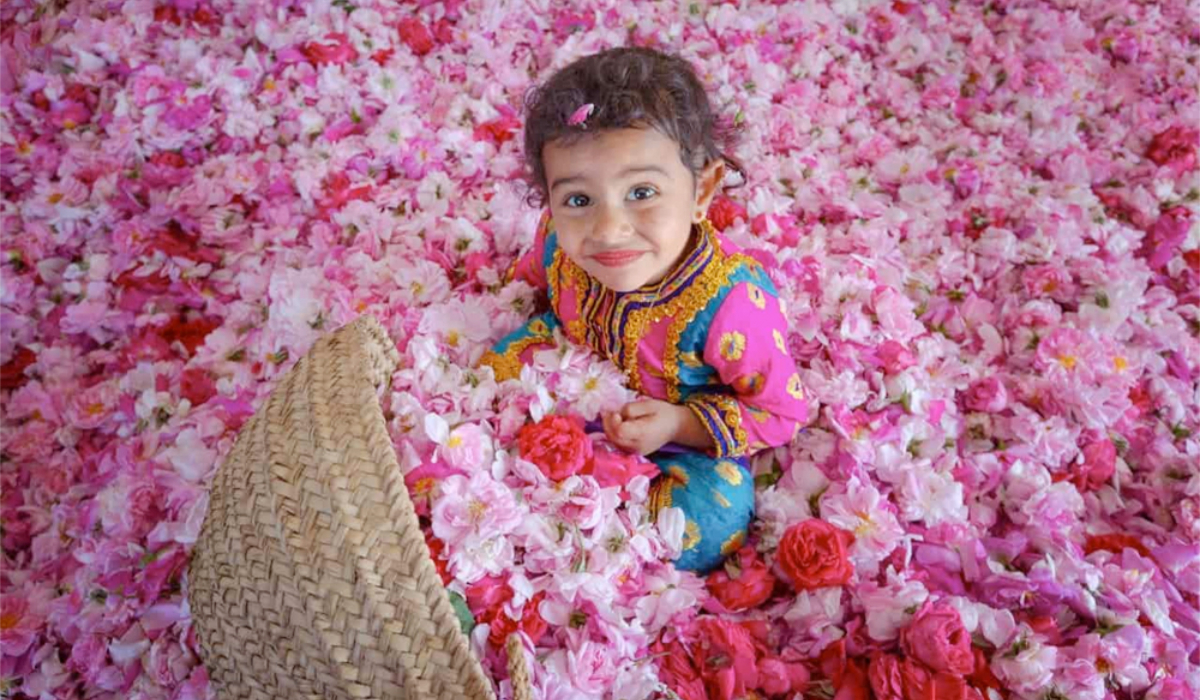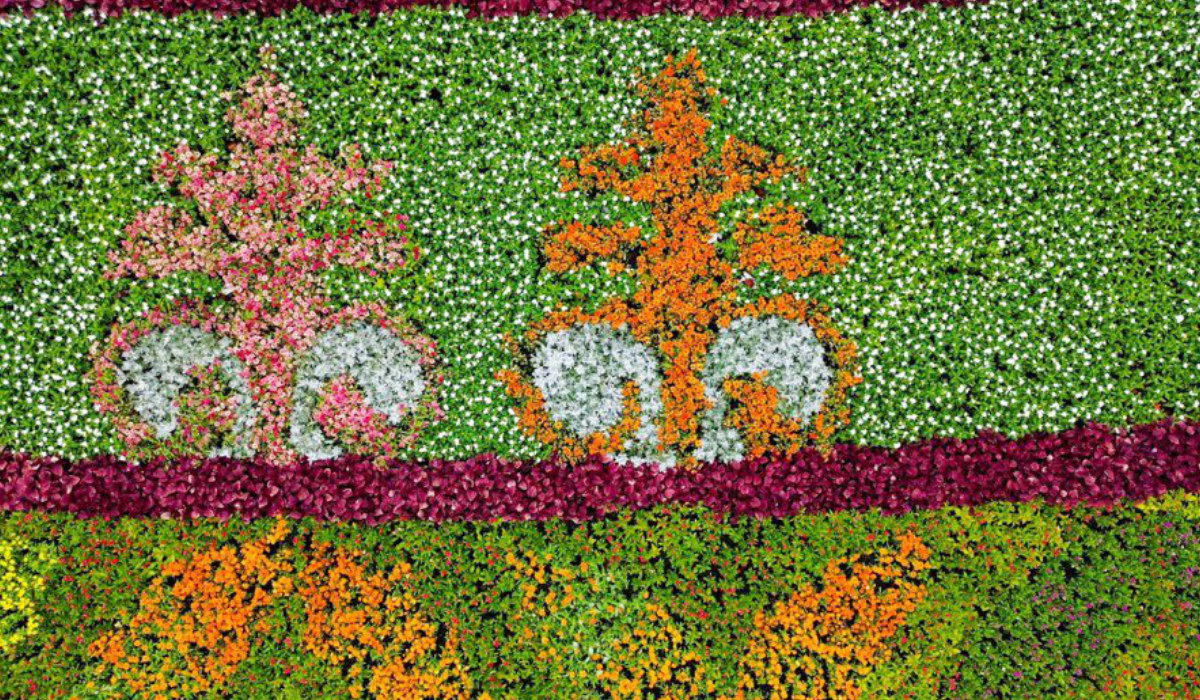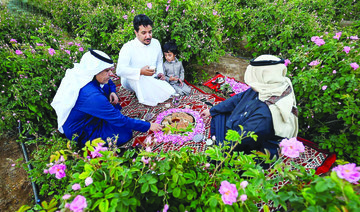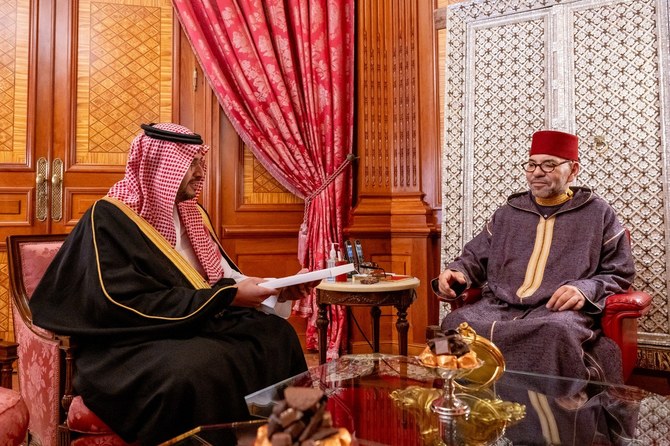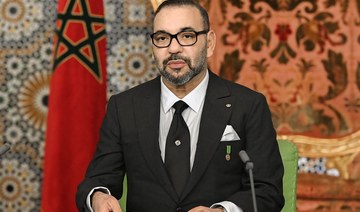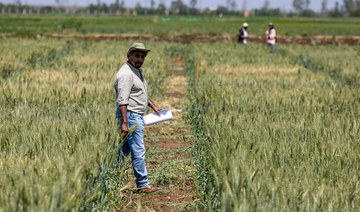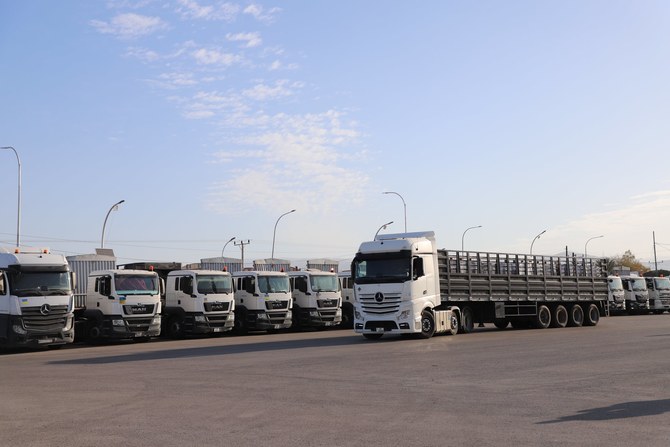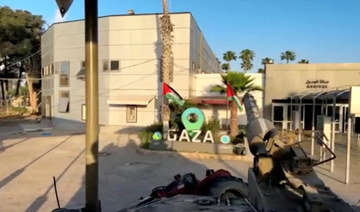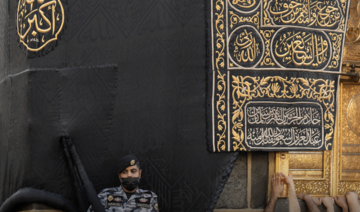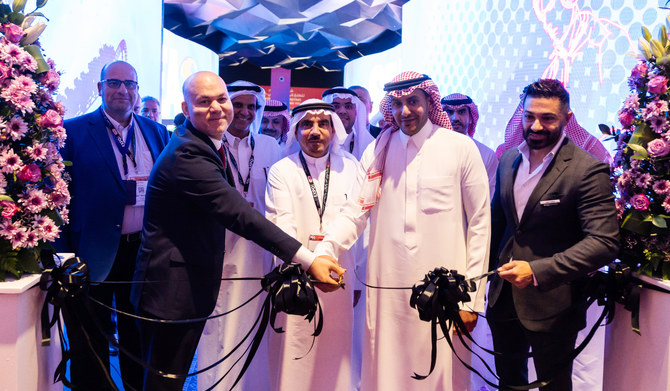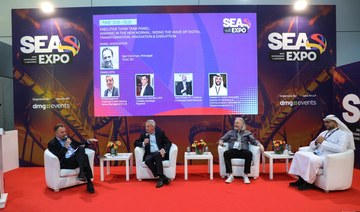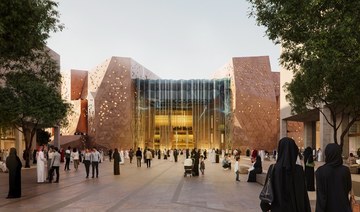RIYADH: Saudi Arabia will continue negotiating with Iran to create a brighter future for both countries, the Kingdom’s Crown Prince Mohammed bin Salman said in an interview published on Thursday.
The two countries were “neighbors for ever,” the crown prince said. “We cannot get rid of them, and they can’t get rid of us. So it’s better for both of us to work it out and to look for ways in which we can coexist.”
Prince Mohammed said there had already been four rounds of talks with Tehran, and more would follow. “Hopefully, we can reach a position that’s good for both countries and is going to create a brighter future for this country and Iran.”
In a lengthy interview with the US magazine The Atlantic, the crown prince discussed Saudi Arabia’s relationship with the US, the pivotal role of Islam as the foundation of the Saudi state along with the Kingdom’s rejection of religious extremism, and Saudi Arabia’s plans for social development and economic growth.
Prince Mohammed said the Kingdom had a “long, historic relationship” with the US, and the aim was to strengthen it. “We have a political interest, we have economic interests, we have a security interest, we have defense interests, we have trade interests, we have a lot. It’s huge.”
However, he rejected interference in the Kingdom’s internal affairs, and argued that attempts to apply pressure on Saudi Arabia were counterproductive.
“Pressure doesn’t work,” he said. “Throughout history, it’s never worked with us. If you have the right idea, the right way of thinking, just keep doing it. People will follow if it’s the right thing. If it’s the wrong thing, then people are going to follow their own way of thinking. And you have to accept it.
“We respect your culture in America, we respect your way of thinking, we respect everything in your country, because it’s up to you. We wish that we would be treated the same. We disagree with many things that you believe in, but we respect it.
“We don’t have the right to lecture you in America, regardless if we agree or disagree with you. The same goes the other way.”
Reflecting on the importance of the Muslim faith to Saudi culture and values, Prince Mohammed said extremists had hijacked and perverted Islam in pursuit of their own malign interests, and Saudi Arabia was reversing that process.
However, he said, “I would not use the term ‘moderate Islam,’ because this term would make the extremists and terrorists happy. The suggestion is that we in Saudi Arabia and other Muslim countries are changing Islam into something new, which is not true.
“We are going back to the real teachings of Islam, the way that the Prophet and the four rightly guided caliphs lived, which was open and peaceful societies. We are going back to the roots, back to pure Islam, to be sure that the soul of Saudi Arabia, based on Islam, our culture, whether tribal or urban, is serving the nation, serving the people, serving the region, serving the whole world, and is leading us to economic growth.”
As a result, the crown prince said, Saudi Arabia was “among the top fastest growing countries in the world.” He said: “Next year, the whole economy is going to grow by almost 7 percent. And Saudi is not a small country, it’s a G20 country growing fast. So where is the potential in the world today? It’s in Saudi Arabia.”
Prince Mohammed said this development would be achieved in a uniquely Saudi way, respecting fundamental Saudi values. “We’re not trying to be like Dubai or trying to be like America,” he said. “We are trying to evolve based on what we have, economic assets and utilizing the potential of the Saudi people, the culture of Saudi Arabia, our background.
“You see it now with your eyes in Saudi Arabia. We did a lot, and there are a few things still to do. And we are going to work to make them happen.”
Read the full transcript of the interview below:
The Atlantic: I've been coming back here since 2019. Every time it's a little more different, more modern, more advanced, 2030 gets closer, and it gets a little bit more like Dubai, even a little bit more like America. Do you think Saudi Arabia will become less Saudi and more like the rest of the world?
The Crown Prince: We're not trying to be like Dubai or trying to be like America. We are trying to evolve based on what we have, economic assets and utilizing the potential of the Saudi people, the culture of Saudi Arabia, our background, and we try to evolve this way.
We want to add something new to the world. A lot of our projects are unique. It's Saudi Arabian. So for example, if you look at Al-Ula, it's uniquely Saudi . There is no other model like it. If you look, for example, at the project in Dir'iyyah, which is one of the biggest cultural projects in the world , it's unique. It is a Nejdi themed cultural heritage project. If you look,, for example, to the old town in Jeddah and the development around it, it's based on Hijazi tradition. So that's unique. That's Saudi Arabia. And if you look, for example, to Neom, and The Line, the main city in Neom, that's unique, that's created and made by Saudi Arabia. It's not a copy of anything elsewhere. It’s evolving and creating solutions that no one created before. And if you look, for example, to Qiddiya Riyadh, one of the biggest entertainment/culture/sport projects in the world, with a size about 300 square kilometers, that's bigger than the size of some small countries.. And you have huge projects of theme parks, cultural and sport elements , real estate, and all that have been synced in a way that it's never been done in Orlando, for example, or anyplace in the world. So we're not copying, we're trying to be innovative. We're trying to use the capital that we have in PIF, the capital that we have in the government budget, in an innovative way, based on our culture or based on Saudi innovation.
The Atlantic: But --
The Crown Prince: Just give me an example! This project is a copy of what? Nothing.
The Atlantic: Can you modernize to the point where the Islamic character of Saudi Arabia becomes weaker?
The Crown Prince: Every country in the world is founded on a set of views and beliefs. For example, America is based on a foundation of views and beliefs: democracy, liberty, free economy, etc, etc, etc. And the people are united based on that. but are all democracies good? are all democracies functioning Well? Definitely not.
Our country is founded on a set views and beliefs that are based on Islam, on tribal culture, , Arab culture, and unique attributes to Saudi culture and beliefs. that's our soul. If we get rid of it, that means the country would collapse.
The question for us is, how can we put Saudi Arabiaon the right path of development and modernization, not the wrong path? The same question faces America: How can you put democracy, and free markets, and liberty, on the right path? Because it could go on the wrong path. So we are not disparaging any of our beliefs, because that's our soul. The Holy Mosques are in Saudi Arabia and no one can remove it. we have a responsibility towards the Holy Mosques forever and we want to put our country on the right path for the sake of our Saudi people, for the sake of the region, and for the sake of the whole world based on our belief in peace and coexistence and the need for us to add value to the rest of the world
The Atlantic: But I think you would also agree that the way that moderate Islam is being promoted right now is very, very different from what we would have seen if we were having a conversation with someone in your position in 1983.
The Crown Prince: I would not use the term "moderate Islam," because this term would make the extremists and terrorists happy.
The Atlantic
They think that's an insult.
The Crown Prince
It’s good news for them if we use that term. If we say “moderate Islam,” the suggestion is that we in Saudi Arabia and other Muslim countries are changing Islam into something new, which is not true.
We are going back to the real teachings of Islam, the way that the Prophet and the four Rightly Guided caliphs lived, which was open and peaceful societies. They had Christians and Jews living under their rule. They taught us to respect all cultures, all religions, regardless. These teachings of the Prophet and the four Caliphs – they were perfect.. We are going back to the root, to the real thing. What happened was that the extremists hijacked and changed our religion into something new for their own interests.
They're trying to make people view Islam their way. And the problem was that there was no one arguing with them, and no one fighting against them seriously. So they had the chance to spread all these extremist views, which led to the creation of the most extreme terrorist groups, both in the Sunni and Shiite worlds.
The Atlantic: People in the religious establishment here said that that this extremism was largely the result of Muslim Brotherhood influence in the 1960s and the 1970s. But it also seems clear that there was a lot of Saudi influence, Saudi conservatism is a real thing.
The Atlantic: Wahhabism.
The Atlantic: So if you say, we're getting rid of this outside Muslim Brotherhood influence, that's one thing. But how are you dealing with the Saudi component of extremism?
The Crown Prince: The Muslim Brotherhood, the Ikhwan, played a huge role in creating all of this extremism. they were the bridge that took others to extremism. When you talk to them, they will not seem to be extremists, but they lead you to extremism. Osama bin Laden, was a member of the Muslim Brotherhood; al-Zawahiri, used to be a member of the Muslim Brotherhood; the leader of ISIS, used to be a member of the Muslim Brotherhood. So the Brotherhood is a pathway. It has been a strong element in the creation of extremist groups in the past decades. But it's not all the Muslim Brotherhood. It's a mix of, many things and many events, not only from the Muslim world, even also from America, for example the invasion of Iraq, that gave a chance for extremists to propagate their massage and rally followers. It is also true that some extremists in Saudi Arabia, not Muslim Brotherhood extremists, played a role in this area, especially after 1979 revolution in Iran, and the hijacking of the Holy Mosque in Mecca.
About Wahhabism, I would say that Muhammad Ibn 'Abd al-Wahhab is not a prophet, he is not an angel. He was just a scholar like many other scholars in who lived during the first Saudi state, among many political leaders and military leaders. The problem at that time in the Arabian Peninsula was that Ibn ‘Abd al-Wahhab’s students were the only people who knew how to read and write and history was written from their perspective. . Ibn 'Abd al-Wahhab’s writing has been used by many extremists for their own agendas. But I’m sure that if Ibn 'Abd al-Wahhab, Bin Baz, and others were alive today, they would be among the first people to fight these extremist ideas and these terrorist groups. The thing is, ISIS doesn't use as an example any living Saudi religious figures. When they die, they start to use their words and twist their views out of context
Ibn 'Abd al-Wahhab is not Saudi Arabia. Saudi Arabia has Sunni and Shiite, and among Sunni, you have four schools, and Shiite have different schools, and all of them are represented in number of religious boards . Today, No one can push one of the schools' views to make it as the only way of seeing religion in Saudi Arabia. Maybe that took place in some parts of our history due to the events that I told you about, especially in the 80s, and the 90s, and early 2000s. But today, we are back on the right track, as I said. We are going back to the roots, back to pure Islam, to be sure that the soul of Saudi Arabia, based on Islam, our culture, whether tribal, or urban , is serving the nation , serving the people, serving the region, serving the whole world, and is leading us to economic growth. And that's what happened in the past five years. So today, I'm not saying we might do this. Maybe if we were having an interview in 2016, you would say I’m making assumptions, and that this is just the analysis of the Crown Prince of Saudi Arabia. But we did it. You see it now with your eyes in Saudi Arabia. Just come and check it out, and watch the videos of Saudi Arabia six or seven years ago. We did a lot, and there are a few things still to do. And we are going to work to make them happen.
The Atlantic: In Washington, when we first met, we were talking about guardianship laws and the pace of change, and you showed me a video on your phone of a group of men firing their weapons at a wedding. I don't know if you remember.
The Crown Prince: I remember.
The Atlantic: And you said, “See, I have to go at the right speed. I can't go too fast. Because these guys want a certain speed." So my question is three years later, do you feel like you're going faster now? Do you feel like you have huge opposition from tribal and religious leaders?
The Crown Prince: I believe I showed you that video because you asked me about democracy in Saudi Arabia.
The Atlantic: Yes.
The Crown Prince: Saudi Arabia is a monarchy, based and founded on that model. And I told you that beneath the monarchy there is a complex structure of tribal and urban monarchical system like tribal chiefs and urban leaders,. So I was trying to give an example of what the semi-tribal monarchy looks like in Saudi Arabia.
The Atlantic: You're saying you can't go too fast.
The Crown Prince: No, I'm saying that I cannot change Saudi Arabia from a monarchy to another type of system, because it has been based on a monarchy for three hundred years, and this complex monarchical structure, of thousand tribal and urban systems have been part of how people lived in the past and it is part of a Saudi Arabia today and its continuation as a monarchy. among the Saudi royal family, you have more than 5000 royals from the House of Al Saud. The members of the allegiance council among them chose me to protect the interest of the monarchy that runs this complex structure based on thousands of tribal and semi-tribal leaders. changing this system is like betraying the Al Saud, betraying these thousands of tribal leaders and semi-tribal leaders in Saudi Arabia.. But all of those leaders help make the changes in Saudi Arabia. So I don't think that they are the people who are slowing change. They are the ones who help me to do more.
The Atlantic: You did tell us last time about how you were listening to the Saudi people, finding out what their appetite was, what their interests were in change. So it seems like you're not all the way to the finish line. You haven't quite done all of the changes that you want to do. How close are you? And how different is the finish line from what you planned?
The Crown Prince: If I told you that I see the finish line, this would mean that I'm a horrible leader. The finish line is something distant. You just keep running, and keep running faster. And keep creating more finish lines and just keep running. Our aim is to be faster than the rest and achieve more than the rest.
The Atlantic: But is there a limit? Will I be able to do here the same things that I can do legally in the United States? Or is there some stopping point because it's an Islamic country?
The Crown Prince: Socially?
The Atlantic: Yes. For example.
The Crown Prince: In Islam, some things are forbidden for Muslims and God specified a punishment for it, and some other things God didn’t specify a punishment—that means the judgment is between people and God.
But if you are foreign, Islamic teachings cannot be applied to you. So if you are a foreign person who's living or traveling in Saudi Arabia, you have all the right to do whatever you want, based on your beliefs, regardless of what they are as long as they are in line with the country’s laws.
That's what happened in the Prophet's time and the period of the four Rightly Guided caliphs. They didn't apply social rules to non-Muslims, regardless of whether they are citizens, or just traveling in their country.
The Atlantic: The fluency with which you speak about Islamic law is really unique among rulers of Saudi Arabia. The position that you're taking is a very modern position, but it's also a very uncommon one among Islamic scholars. So should we in the future expect rulers of Saudi Arabia to themselves take close personal interest in questions of Islamic law? In the past, the religious scholars were in control of this area.
The Crown Prince: In Islamic law, the head of the Islamic establishment is wali al-`amr, the ruler. So the final ruling is not for the mufti. The final fatwa is for the King. So the mufti and the Fatwa Board are like advisers to the King, to give him what they advise. But in Islamic teachings, the ruler, has the final fatwa, has the bay'a. The final word is for the King of Saudi Arabia. They know that they can argue – you have to argue, you have to explain yourself, you have to use evidence, based on Islamic jurisprudence, based in the Prophet's time, based in the Caliph’s' time, you have to look into the Koranyou have to argue hadith, until you make your point. And then you have to make sure the people are ready for it and believe in it. And then the King makes that decision. But just if you use the power as a King and make the decision, without going through the whole process, this could create a shock in the street and shock to the people.
The Atlantic: I've heard you speak about the importance of the mutawatir of Hadith, for example, and this level of discussion of Islamic law is not something we usually hear from a crown prince or a king.
The Crown Prince: That's the main source of division in the Muslim world, between extremist and peaceful Muslims. You have tens of thousands of hadith. And, you know, the massive majority, are not proven and are being used by many people as the way to justify doing what they are doing. For example, Qaida followers, ISIS followers, they are using Hadith which are very weak, not proven to be true Hadith, to propagate their ideology.
So, simply put: God and the Qu'ran tell us to follow the Prophet's teachings. And at the Prophet's time, people were writing down the Koran, and writing down the Prophet's teachings, so the prophet ordered that his teachings not be written down to make sure that the main base remains the Koran, so when we go to the Prophet’s teaching, we have to be very careful. And they are grouped in three categories.
First, what is called mutawatir. So that means, several people heard it from the Prophet, a few people heard from those few people, a few people heard [it] from th[os]e few people. And that has been documented. Those are almost super strong, and we have to follow them. they are few in number around 100 hadith.
The second category is what we call the individual Hadith. So, one person heard it from the Prophet and another person heard it from that person, all the way to the one who documented it. Or a few people heard it from the Prophet, a few people heard it from the Prophet, and one person heard it from those few people. So, if there is a one-person link in the lineage of the Hadith, we call it one-person hadith. So that one we call
ahad. And you should study whether it is true , whether it goes with the teachings of the Koran, if it goes with the teachings of mutawatir, and if it goes with the interest of the people. And based on that, you use it or not.
The third one was called khabar. Someone heard it from the Prophet, etc, etc., and among the links are some that are unknown. Those are the tens of thousands of Hadith, and that you shouldn't use at all, except in one case: if you have two options, and both of them are very good. And you can use that khabar hadith in that case, provided that it is in the interest of the people.
So that's what we are trying to identify and publish, to educate the Muslim world about how do you use Hadith. And I believe that will make a huge difference. It needs time. We are in the final stages, I think we can put it out and maybe two years from today. It's just the documenting hadith in the right way. Because people when they read different books, they do not have the mindset or the brain or the knowledge to look into the lineage of the hadith and differentiate between them We just put it simply: this is proven.
The Atlantic: My question then is, since you're able to talk about this with such fluency and knowledge, why do you need a Mufti? You can do it yourself.
The Crown Prince: Because the Mufti’s job is to answer the people who ask day-to-day questions, questions of daily interest. So for example, if someone ate in Ramadan and he wants to know what he should do, did he sin or not, and then he wants to call someone to give him an answer to that, that should be regulated. So no one can just say, "I know how to do it" and can answer his question. it has to be regulated. You have to have certificates from the government. So the Ifta' board and all the people working in that area, that's their goal: to answer the people's questions about their needs.
The Atlantic: Could I come back to something that you said before? You told a story about the Prophet himself being very tolerant, looking the other way. It's up to God to judge a person's sins. But Saudi Arabia uses the death penalty very frequently, and comes under a lot of criticism for using the death penalty so frequently, and you have amputation and other punishments dictated by Islamic law. Does all this mean that you want to get rid of these physical punishments for people's sins?
The Crown Prince: Well, about the death penalty, we got rid of all of it, except for one category, and this one is written in the Qu'ran, and we cannot do anything about it, even if we wished to do something, because it is clear teaching in the Qu'ran. If someone killed someone, another person, the family of that person has the right, after going to the court, to apply capital punishment, unless they forgive him. Or if someone threatens the life of many people, that means he has to be punished by the death penalty. That's a teaching in the Qu'ran. Regardless if I like it or not, I don't have the power to change it.
The Atlantic: But you can set a tone to encourage more forgiveness.
The Crown Prince: We are doing that. So if you have time, we can take you to all governorates, and if you go to the headquarters, there is a department just working on that issue. And if there is a death penalty, it's not carried out right away. It would be carried out after six months or even one year, to give time to the family of the victim to cool down, to stop and think. And a high percentage of executions are canceled based on these kinds of settlements. So we are doing our best in that area. But we are going to do more about that. The flogging penalty—that's being cancelled totally in Saudi Arabia. There's nothing. It's been canceled one hundred percent. The only issue that we’re working on you're trying to close is to be sure that there is no penalty without a law. And we are working with that. So there are a few penalties that are up to the discretion of the judge. And now we are trying to be sure that there is no penalty in Saudi Arabia without a law. We're talking about that and trying to stop that in the next two to three years.
The Atlantic: A related subject. The CIA, as you know, says that, based on their beliefs and their study of the situation, that you ordered the killing or capture of Khashoggi. What is your response to that conclusion?
The Crown Prince: Well, first of all, it’s painful to see any person being killed unrightfully. So even if a person deserved the death penalty, they would still have to go through the legal system, and have the right to defend themselves, etc. . So what happened was painful. And we wish that it didn't happen to a Saudi citizen, or to any person in the whole world. That was a huge failure in the system. And we did our best to fix the system and to make sure that this doesn't happen again. We also took actions that any rightful government would take, by moving those people to investigation and taking them to court. And then the court decided different punishments for those people, and they are serving these punishments. And that's what happened when Americans made mistakes in Iraq or Afghanistan or Guantanamo. You took the right steps, and we did too.
The Atlantic: But you’re saying that you had nothing to do with it.
The Crown Prince: Why would I do it? That's obvious.
The Atlantic: We’ve talked about this before. You said something about this whole incident, the whole controversy, that it actually hurt you.
The Crown Prince: Definitely, it hurt me a lot. It hurt me and it hurt Saudi Arabia, from a "feelings" perspective.
The Atlantic: From a “feelings” perspective?
The Crown Prince: We've been blamed. I understand the anger, especially among journalists. I respect their feelings. But we also have feelings here, pain here. We feel that we are not treated fairly. I feel, myself, that human rights law wasn’t applied to me. Article XI of the Universal Declaration of Human Rights states that any person is innocent until proven guilty. I didn't get that right. So how can you talk to me about human rights without treating me according to my Article XI human rights? That doesn't make sense. So it's a painful feeling, to know that we've been treated this way. But at the same time, we understand the feelings. But the biggest question for me is this: That year, almost 70 journalists were killed, worldwide. Can you name them for me? No? So, thank you very much. Is this really a feeling for a fellow journalist? Or is this a design against us, and against me? If it’s really a feeling for a fellow journalist, give me the 70 names of the journalists that were killed that year.
The Atlantic: So why do you think this case got so much attention?
The Crown Prince: Because there are a lot of people who want to be sure that our project, Saudi Arabia's project today, Vision 2030, fails. But they can’t touch it. It will never fail. No one on the whole world has the power to make it fail. You can slow itsay by five percent. That's the maximum that you can do. But more than that—no one can do anything. There are a few groups—I don't want to point fingers—but anyone with good knowledge can make the link between groups in the West, and groups in the Middle East, who have interests in seeing us fail.
The Atlantic: You believe that Khashoggi himself was arguing a Muslim Brotherhood argument against your plans?
The Crown Prince: I never read a full Khashoggi article in my life. Either in Saudi newspapers or an American newspaper. What I read is my daily brief. And if there is something important in the local media, regional media, global media, it comes up.
The Atlantic: So he never bothered you?
The Crown Prince: I never read a full article of his.
The Atlantic: Are you confident that nothing like that will happen again? That is –
The Crown Prince: Well, I’m doing my best to make sure that we have the governance, the right process and procedure to be sure that things like that don’t happen again. That’s my commitment. But –
The Atlantic: If, for example, another squad is found, should we be concerned about your control over –
The Crown Prince: Hopefully not. So I’m trying to do my best at that. You know, we’ve suffered. I don’t want it to happen again. It was a huge mistake. So we don’t want that to happen again. We want to be sure that our system is really mature, and nothing like that could happen again.
The Atlantic: I met Khashoggi one time, just a few weeks before he was killed, and I asked him, ‘What do you really want? Do you want the overthrow of the House of Saud?’ And his answer to me was ‘No, I think the House of Saud should rule Saudi Arabia forever.’ And it struck me when he was killed, that someone who is in favor of the continued rule of the House of Saud, if he is considered an enemy, there must be many other people who are considered enemies as well. There seems to be an atmosphere of fear in this country.
The Crown Prince: No, I don’t believe that. In any case, if that’s the way we did things, Khashoggi would not even be among the top one thousand people on the list. If we assume for argument’s sake that we were ’ going to go for an operation like that, , it would have been professional and someone on the top of the list
So why Khashoggi! That was a really a huge mistake. And we don’t believe in that kind of operations. We don’t believe in any operation outside of the law. We believe if there’s anyone who committed a crime, or anyone who is dangerous to Saudi Arabia, or committed a crime in Saudi Arabia, or is dangerous to the rest of the world, we will take action based on Saudi law, based on international laws and based on other countries’ laws. And that’s the procedure we did in the past, and that’s what we are going to do in the future.
The Atlantic: Among other things, this killing of Khashoggi damaged relations with the United States. What do you want Joe Biden to know about you that he might not know? Because this incident has –
The Crown Prince: Simply –
The Atlantic: Yeah?
The Crown Prince: I don’t care.
The Atlantic: What do you mean?
The Crown Prince: It’s up to him to think about the interests of America.
The Atlantic: What are the interests of America in Saudi Arabia?
The Crown Prince: Well, I’m not an American, so I don’t know if I have the right to talk about American interests or not. But I believe that any country in the world has main pillars of interest: economic interests, and political and security interests. So that’s the main foundation of the foreign policy of any country. How can I boost my economy? And how can I maintain my security? And how can I boost my economic and political ties, to be sure that my country is safe, and to be sure that my country is growing and having more access to investment and trade, etc,. So I believe that’s the interest of America, to do that .
Saudi Arabia is a G20 country.’. You can see our position five years ago, it was almost 20. Today, we are almost 17 among the G20 countries. And we are aiming to reach a place more advanced than 15 by 2030.’for example, in 2021 we aimed to have 5.9 percent GDP growth’’’, we ’believe we reached 5.6 for 2021. And that’s definitely among the top fastest growing countries in the world. Next year, the whole economy is going to grow by almost 7%.. And Saudi is not a small country, it's a G20 country growing fast. So where is the potential in the world today? It's in Saudi Arabia. And if you want to miss it. I believe other people in the East are going to be super happy to see—
The Atlantic: What people do you mean?
The Crown Prince: At the same time, you’re trying to push them back. So I kind of don’t understand that.
The Atlantic: What do you mean, "push them back"?
The Crown Prince: Well, just take it as it is.
The Atlantic: No, but stay on that. I mean, are you comfortable with China in a way that you haven't been comfortable in the past?
The Crown Prince: We have a long, historic relationship with the United States. For us in Saudi Arabia, our aim is to keep it and to strengthen it. We have a political interest, we have economic interests, we have a security interest, we have defense interests, we have trade interests, we have a lot. It's huge. And we have a huge opportunity to boost all of these things. And there is also a big possibility it could be downgraded in many areas. If you ask Saudi Arabia, we want to boost it in all areas.
You don't have the right to interfere in our internal affairs. That's about us Saudis, and no one can do a thing about that. If you believe that you have the right social viewsvalues and if they are strong, then you’ll get a win without pressuring us. Let me give you an example. We didn't get rid of slavery 60 or 70 years ago because we had any pressure. But we had good influences from foreign countries. Saudi people studied abroad, and American companies, European companies, different companies, came and worked in Saudi Arabia. And their influence was strong. We realized that this is wrong and cannot go on and we changed over time and got rid of it
Pressure doesn’t work. Throughout history, it’s never worked with us. If you have the right idea, the right way of thinking, just keep doing it. People will follow if it's the right thing. If it's the wrong thing, then people are going to follow their own way of thinking. And you have to accept it. So for example, in Saudi Arabia, we respect your culture in America, we respect your way of thinking, we respect everything in your country, because it's up to you. We wish that we would be treated the same. We disagree with many things that you believe in, but we respect it.
We don't have the right to lecture you in America, regardless if we agree or disagree with you. The same goes the other way. That said, I don't think that we as Saudi Arabia have reached the social standard that we are aiming for. Still, we are going for the areas that we think that we as Saudis are confident in, based in our culture, on our beliefs in Saudi Arabia.
The Atlantic: Bring this back to China if you could.
The Crown Prince: Saudi Arabia is one of the fastest growing countries in the world,. We have two of the 10 biggest global funds. We have the one of the largest global cash reserves. Saudi Arabia has the ability to provide 12 percent of the world's oil. It is situated between three main straits; Suez, Hormoz and Bab Al-Mandab, it overlooks the Red Sea and Arabian Gulf in which 27% of world trade passes through, The total Saudi investment in America is 800 billion dollars. In China to date we’ve invested less than 100 billion dollars. But it seems that things are growing very fast there. The American companies have a huge concentration in Saudi Arabia. We have more than 300,000 Americans in Saudi Arabia, some of them Saudi-American, living in Saudi Arabia, and it's growing every day. So the interest is obvious. Whether you want to win in Saudi Arabia or lose it in Saudi Arabia, is up to you.
The Atlantic: If we accept, though, that the United States can't influence Saudi Arabia in internal affairs –
The Crown Prince: Actually, if you try to pressure us on something that we believe in already, you just make it harder for us to implement it.
The Atlantic: But America looks at its allies and judges whether those allies are safe long-term allies according to whether they are pursuing policies that are similar to American ideology or interests. So if we see fast economic growth that is not combined with political liberalization, or is combined with the opposite of political liberalization, we are going to see that it looks much more like China. That looks much more like Russia. And should we be uncomfortable?
The Crown Prince: No, no. So, for example, in Saudi Arabia, is social development going backward or forward? Just see what's happened five years, see what's happening today, and see what's going to happen next year. It's definitely going forward. You don’t need an expert to see this. Just do your own research on the internet, or just make a short trip to Saudi Arabia, and you can see that. Talk to the locals, any locals among the almost 33 million living in Saudi Arabia, around 20 million of them Saudis, they're going to tell you that. So definitely, socially we are going in the right direction. Regardless, the end game won’t look like 100 percent of your social standard. Let's say it’s going to be something between 70 to 80 percent. Where we are today, I will say we are at 50 percent and there is 20 to 30 percent to go. We will not reach 100 percent because we have some beliefs that we respect in Saudi Arabia. It's not me. It's the Saudi people, and it is my duty to respect and to fight for the Saudi beliefs and for my belief as a Saudi citizen among them.
The Atlantic: You sometimes seem surprised that Americans aren't giving Saudi Arabia more credit on women's issues.
The Crown Prince: We’re not doing this for credit. We don't care. We do what we do for us as Saudis. You know, if you look at it from the right angle – well, thank you very much. If you don't care, it's up to you.
The Atlantic: Constitutional monarchy. Could this be in Saudi's future?
The Crown Prince: No, it won't work. It doesn't work. Saudi Arabia is based on pure monarchy, and the complex monarchical structure beneath it; Tribal, Urban and the Saudi royal family, which I represent, and the Saudi people, which I represent, and the King is the leader of this monarchical structure and he protects their interests. And they are 13 to 14 million Saudis, among the 20 million Saudis, so I cannot stage a coup against 14 million citizens.
The Atlantic: Did you ever find the ideas of democracy or even constitutional monarchy attractive in any way?
The Crown Prince: Well, definitely. There's a lot of ideas that are attractive. Democracy is attractive, constitutional monarchy is attractive. But it depends on where, and how, and what the background is. So, democracy in America is interesting. It paved the way for the largest GDP on the planet, it made a great country, it provided a lot of great things for the whole world. But it was founded and designed based on the situation that you had, from getting the British out, to uniting America. So you design your political system, your economical beliefs and your social beliefs based on a way that fits you the best, and then you evolve. If you look at America 100 years ago, for example, some social beliefs then were ridiculous! Even for us in Saudi Arabia, we look at it as ridiculous. but it evolved.
But Saudi Arabia is not an absolute monarchy, in the sense that His Majesty cannot wake up tomorrow and do whatever he wants. There is a rightful way of running this country, which is the Constitution that states clearly that there are three branches of power. The executive, which is led by His Majesty as the prime minister. But the two others are not led by him, but are appointed by him. There are institutions and processes and procedures. Here’s an example about how you make a decision. we wanted to allow women to drive in 2015. But we couldn't do it until 2017. So that shows you that we worked by the book, by the Constitution, in front of the people. If we run the country randomly, like a tent, that means the whole economy is going to collapse, that means no one is going to invest in Saudi Arabia, that even Saudis are not going to believe in us. We can’t just run it randomly. That’s the Qadhafi way.
The Crown Prince: So the Saudi royal family, it's [from] before 600 years, even before the second Dir'iyya, as a ruling family. They founded Saudi Arabia before 300 year, and it collapsed for seven years, [and came] back again, collapsed for 10- years, and then back again.... So we have many lessons. And we've evolved, and the system [has] evolved. And each generation when they come, they come based in a system based on those institutional three branches of power. And when a new king comes, a new crown prince comes, they don't undermine these institutional branches, because that's the power of Saudi Arabia. That's what makes Saudi Arabia a G20 Country, [with] 12% of the world's oil needs, the second largest proven oil reserves, two of the biggest sovereign wealth funds in the world, etc, So what made that [is that] each generation comes, and keeps building on it, and invest in it and evolve it for the future, as Americans [did] in the past 300 years.
The Atlantic: I've heard some Saudis say that with each generation there are more and more Royals, and maybe eventually there will be too many, and some should lose the royal title. Do you think that's a possibility?
The Crown Prince: Go talk to them.
The Atlantic: I know what they will say.
The Crown Prince: In Saudi Arabia, we don't have blue blood. Our way as a royal family, it's to serve the people. We are part of the people. For example, my mother is not from a royal family. She’s from a tribal family, from Ajman, from Yam, almost 1 million people in Saudi Arabia. And if you look at the royal family, we have marriages with non royals, and we are part of them. And we live and are raised here, and we are part of the Arabian Peninsula. And we've been ruling towns since history has been written, as Banu Hanifa, even before even Islam. And we established the first Dir'iyya, unknown when, and then established the second Dir'iyya 600 years ago, and then we established Saudi Arabia 300 years ago. So we are part of the people. So no royal has a special right that he can practice against the people. If he crosses a red line, he's going to be punished like any person in Saudi Arabia. If you commit a crime, you're going to be punished and face the law as a person in Saudi Arabia. You're from the royal family. It's a title that you have to respect. And that's it.
The Atlantic: Let’s talk about the Ritz-Carlton incident then. This became controversial, in part because you used a fancy hotel as a prison. But on the other hand, Graeme said something interesting to me. He said, "They could have used a prison, but they used a luxury hotel."
The Crown Prince: Yeah. Because it wasn’t arresting people, what happened in the Ritz-Carltonwas about giving them two options. One, we're going to treat you totally by the law. So, the public prosecution went to prepare the list of charges. And the other option given to people was to ask them if they wanted the negotiation path. So almost 95 percent chose the negotiation path. So up to that part they’re not criminals, we cannot put them in jail. They agreed to stay in the Ritz-Carlton to negotiate, to close the negotiation. And I believe that almost 90 percent of the negotiations have been closed. The rest, the ones who refused to negotiate, they turned to public prosecution based on Saudi law. And a good percentage have been shown to be innocent people, either through negotiation, or in the courts.
The Atlantic: So the role of the Ritz Carlton was not to eliminate rivals?
The Crown Prince: Rivals don’t exist in the first place to have a need to eliminate them by putting them in the Ritz Carlton. How can you eliminate people who don’t have any power to begin with.
It's purely trying to stop a huge problem in Saudi Arabia: that for each budget, a very big percentage goes to corrupt people. we cannot have the 5.6 non oil GDP growth, we cannot have 50% raising of foreign investment in Saudi Arabia [in] 2021 if corruption continued, I can't have qualified ministers and qualified key people working in the government, fighting day or night, working 24 hours, if they don't believe it's a rightful, true path that they are going on. That will never happen if there's corruption in Saudi Arabia
The Atlantic: How did it come to your mind to do this?
The Crown Prince: It's not me. One of King Salman’s requests at the beginning of 2015 was, “Get rid of corruption." The government started collecting and preparing the files from 2015 to 2017, and to discuss the best course of action. And then the action was taken by His Majesty.
The Atlantic: Do you think that it helped?
The Crown Prince: Definitely, first that was a strong signal. And then some people thought Saudi Arabia was, you know, just trying to get the big whales, the good big corrupted whales. But I believe [by] 2019 to 2020, they understood even if you steal $100, you're going to pay for it. And a lot of people made that mistake.
The Atlantic: Talk about Qatar for a minute. Your position now is much different than it was just months ago.
The Crown Prince: It's like a fight in a house.
The Atlantic: A family fight. Is the family fight over?
The Crown Prince: Definitely. It was a fight between brothers. And, you know, definitely they're going to move on. And definitely, we’re going to be best, best friends. GCC countries, have the same political systems. We have the same political view 90 percent of the time, let's say. We have the same security dangers, we have the same economic challenges and opportunities. We have the same society and social fabric.
So we are like one nation, all of us as GCC countries, and that's what pushed us to establish GCC and that's what pushes us to work together—because working together is going to assure our security, is going to assure that our economic plan is going to succeed, and going to show that our political agenda can also succeed. Definitely, there's a few differences. And our role is to strengthen the interests and work out the differences. And that's what's been happening through the whole story of these two countries.
The Atlantic: Some Saudi citizens think this was a kind of Cold War between the countries. They were afraid of what might happen to them, or their families, if they spoke in favor of Qatar. How do you think it feels to them to suddenly see this warmth, as if the relationship is fixed? It seems like a big change.
The Crown Prince: I don’t want to talk about negative things. We are over it. Today we have unbelievable, amazing relations with Qatar. Sheikh Tamimi's an amazing person, an amazing leader. Same goes for the other GCC leaders. Our aim and focus is on how to build a great future. we are very, very close. And it's like, we are better than ever in history.
The Atlantic: The other big question, obviously, is whether you think you have a more positive relationship with Iran. That's not a family fight. They're not in the GCC.
The Crown Prince: They are neighbors. Neighbors forever. We cannot get rid of them, and they can't get rid of us. So it's better for both of us to work it out and to look for ways in which we can coexist. And we had a four-rounds of negotiation. We heared statements from Iranian leaders which we welcome in Saudi Arabia. And we are going to continue through the details of the negotiation. Hopefully, we can reach a position that's good for both countries and is going to create a brighter future for this country and Iran.
The Atlantic: But you’d rather have a nuclear deal than no nuclear deal?
The Crown Prince: Well, I believe any country around the world that has a nuclear bomb—that's dangerous, regardless if it's Iran or any other country. So we don't want to see that. And also, we don’t want to see a weak nuclear deal, because that's going to end up with the same conclusion.
The Atlantic: The Prime Minister of Israel just paid an open visit to Abu Dhabi. Do you think that Saudi Arabia might follow some of these other Arab nations in having an open relationship, diplomatic relations with Israel?
The Crown Prince: Well, the agreement between the GCC countries states that no GCC country will take any action—political, security, economic action—that harms other GCC countries. And all GCC countries have committed to this. Regardless of that, each country has independence to do whatever they want, based on their views, and they have a total right to do whatever they think that's useful for UAE. For us, we hope that the conflict between the Israelis and Palestinians is solved. We don't look at Israel as an enemy, we look to them as a potential ally, with many interests that we can pursue together. But we have to solve some issues before we get to that.
The Atlantic: Something that people say about you is that you’re very sensitive to criticism. It comes out of the Khashoggi killing, but not only Khashoggi. And I know you don't care what Joe Biden thinks of you. But you're the Crown Prince, this is an absolute monarchy, you have a lot of power. And people might think, someone in your position could handle criticism. Do you think you're good at handling criticism?
The Crown Prince: Well, thank you very much for this question. If I couldn’t handle criticism, I would not be sitting with you today listening to that question. And the previous question, and the next question you would ask.
The Atlantic: I'd be in the Ritz Carlton?
The Crown Prince: Well, at least it's a five-star hotel.
What I will say here is that I don’t know where that conclusion comes from. So if you can use an example, like, why did you react to something the way you did, then I could answer.
I believe the Saudi media should criticize the government’s work, the government’s plans, whatever, because that's healthy.
The Atlantic: Do they not do it enough?
The Crown Prince: No, they are doing this in a good way. They are arguing things, they are spreading thoughts, they are arguing each plan, they are arguing each strategy, they are arguing each policy by each ministry and that's healthy. We need that, because you need the views of many people, for me as crown prince of Saudi Arabia, that's healthy for me—even the global media, West and East, write about Saudi Arabia, if it's objective writing, without any ideological agenda, that's super helpful – and healthy. We've learned about a few mistakes from that kind of writing, that kind of reporting. We get a few ideas from that kind of writing and reporting. So that's healthy. We need that.
The Atlantic: And you feel like you're getting very honest, direct advice from your advisors. Not just your brother, do you feel like you're surrounded by people who are telling you the truth and giving you straight—
The Crown Prince: Yeah, if I have a yes-man around me, he’s got to be out as soon as possible.
The Atlantic: You like arguing?
The Crown Prince: I definitely like arguing. And also I like to go to work. I believe each minister in the cabinet, each advisor of the Royal Court, are very capable people. I'm very lucky to have them. I've been very lucky to bring them on in the past few years. They have amazing brains, amazing thoughts. They have the passion of what they believe in, regardless of which sector. They push very hard to make things happen. And they argue very hard. And then at the end of the day, you know, we take the actions based on the laws of Saudi Arabia, that will lead to the interest of the country.
For example, actions in Saudi Arabia in the executive branch are taken by a vote among the cabinet. It's not the king or the crown prince saying "We've got to do that." By the procedures, His Majesty and I, we cannot vote first. We have to be the last two people who vote so we don't influence the thoughts or the votes of the ministers. And many ministers vote against my will. They are there and still doing a lot of great things. And that's what you need in any institution, you know, company or country.
The Atlantic: Would you have the power to give a pardon or a reduction in punishment? Much like the state of Kuwait recently did to political prisoners.
The Crown Prince: Yes.
The Atlantic: That's something that's within your capability, and would you consider doing that?
The Crown Prince: Well, that's not my power. That's in His Majesty's power. The same goes, for example, for the president of the United States. He has the power to give political pardons.
For us, you have, let's say, the extreme left and extreme right. So if you give pardons to one side, then you’ve got to give pardons to some very bad people—which would take everything backwards in Saudi Arabia.
The Atlantic: So it's a dangerous thing to do at this point?
The Crown Prince: The king want to defer this to the judiciary. If we have problems, it will be fixed through improving the quality of the justice system.
The Atlantic: When I've asked Saudis who are the historical figures who the Crown Prince should be compared to, they said Abdelaziz will be one. But they also mentioned King Faisal, because King Faisal also was ruling during a time when there was great danger to the kingdom, from communists, from Nasserites, etc. But they say that King Faisal was never as harsh in some of the penalties against dissenters as you have been. So do you think you're ruling in a time that is even more dangerous than Faisal's?
The Crown Prince: Well, again, the penalties haven't been made by me. It's made by the judiciary system of Saudi Arabia based on Saudi law. You know, I'm not defending the Saudi law, I'm not telling you that it's the best law in the world. There is a long way to work on it, to change it through the cabinet, executive power, through the Shura Council in Saudi Arabia, And we've changed a lot and there is a long way to go for the rest until you reach a high standard globally. But again, it's not made by me. It's made in the end, the penalties are made by the judiciary. So we could have different kinds of events at different times. The penalties get out based on the views of the judge, and based on the Saudi law.
The Atlantic: Maybe I could ask it a different way. This is clearly a time of great promise for Saudi Arabia. Is it also a time of great danger?
The Crown Prince: Danger of what?
The Atlantic: Danger of political unrest, danger of discontinuity of power? We've been told by many of your advisors that if the crown prince does not succeed, we may have the Islamic Emirate of Arabia, we may have a true disaster.
The Crown Prince: Yeah. So definitely, His Majesty's duty, and my duty, is to be sure that it's not about him or about me. Yes, we made changes in a big way in Saudi Arabia. we learn from each generation's mistakes, and we watch very carefully, and we want to be sure that they are not repeated. Whatever is happening, whatever projects in Saudi Arabia, it should be continuous. And the succession should be peaceful, and continuous. So if you look to the past 100 years, it’s been peaceful. when a King dies, the crown prince becomes the king, and you have another Crown Prince, hopefully a long life for His Majesty.
The Atlantic: So have the people who've been speaking to me been exaggerating when they say that if Vision 2030 doesn't work out, then there would be a geopolitical disaster in Saudi Arabia?
The Crown Prince: Well, I cant tell what may happen in this case. Hopefully, we don't think about it or reach it. We just think of how to proceed and make progress and make things happen.
The Atlantic: I noticed that there was a change in the rules of allegiance in the Hayat al-Bay'a, that says that after the sons of Abdelaziz are rulers, after that point, the Crown Prince cannot come from the same branch as the King.
The Crown Prince: That's right. So I cannot choose Khalid as a crown prince, for example.
The Atlantic: Okay. Nor your children, also –
The Crown Prince: I have to choose from a different branch based on the allegiance council law.
The Atlantic: And how will you make that decision when that time comes?
The Crown Prince: You will be the last person to know about that. This is one of the forbidden subjects that only we as royals – His Majesty and me and the 34 members of the Hayat al-Bay'a will talk about. They will give their life before they talk about any of these issues.
The Atlantic: Do you think there was a way to make any of these reforms without any of the dramatic measures that you've taken, including the Ritz Carlton, including at least the perception that people are unable to dissent publicly? Could these things have happened in a more open, liberal way?
The Crown Prince: I don’t want to argue my case again. But I believe that what we've done in Saudi Arabia, this was the only way to make it happen. And, you know, sometimes you have to push in areas where you have to make decisions that have some, let’s say, side effects and it’s sometimes a decision between bad and worse. And you have to make these decisions for the sake of the nation.
The Atlantic: When we spoke before, you told us a bit about how you keep your finger on the pulse of the nation, and you mentioned your appetite for social media. How much time do you spend on Twitter, Snapchat, and such?
The Crown Prince: You know, on the weekend I don't try to engage. I used to, you know, from 2009 until early 2018, I barely took a weekend off. If I took one weekend in two months, that would mean I'm lucky. I gained a lot of weight. It was tough. But since 2018, I started to take weekend vacations. When everything was established — good people, good governments etc, etc, etc, — plans were there and we had just normal daily work. So on the weekends, vacations, I tried to switch off. Without that I was going to collapse. And workdays – I work all day. I spend 10, maximum 20 minutes on social media every day
The Atlantic: But you're looking at Twitter?
The Crown Prince: I look through it all—Twitter, Instagram, you name it, all of it. So I just want to be sure that my media team knows that I'm searching myself. I read Apple News. It's amazing, bringing all these newspapers on one application. I love it. So that's one of the things that I read. A few newspapers in Saudi Arabia, global newspapers. So on social media, I spend let's say 20 minutes and other media I spend like half an hour. Mainly when I eat breakfast with my family. TV's on, iPad's on, breakfast is on also. And I just do both or three things at the same time with the family. Reading the news, watching –
The Atlantic: What do you watch?
The Crown Prince: Well, you know, when I watch movies or series I try to see something outside my world. For example, House of Cards is not good for me.
The Atlantic: It's like going to work?
The Crown Prince: When you watch it, it's like, you know, you start to think about work. So for me, it's like Foundation is a good thing to watch. Foundation, it's a new series. It's unbelievable. Amazing. Game of Thrones, for example. It's great.
The Atlantic: Game of Thrones is also a little bit like work.
The Crown Prince: It’s more fantasy, sci-fi.
The Atlantic: Do you have a favorite Game of Thrones character?
The Crown Prince: Ah, no. So there are many interesting characters, let's say. Very interesting characters. So that's what makes a really good, interesting story, interesting argument, interesting characters. It's amazing. But what I'd like to watch is something outside this world. Fantasy, sci fi, superhero, animation, whatever. But something. Marvel or Japanese animation or whatever. So it's like, just get me out. So I do that mostly half an hour a day before I sleep. On the weekends, I like to do sports. Actually I do one day cardio, like one-and-a-half hours. I don't like to do it in the gym. It's horrible. So I tried to do it by playing a game. Basketball is my thing for this. For me, I play basketball just for one reason: soccer, you could get injured. And if you get injured you could stop exercising for three or four months. So I don't want to get in that. Basketball is safe, so you can move a lot, for a good amount of time while also playing a game, and enjoying your time, so that's really good.
The Atlantic: What do you listen to?
The Crown Prince: Well, I don't like the new Arab music. Some of it is good. But mainly the old music is better. Also, I like to listen to national music from different countries.
The Atlantic: I mean, we noticed that you're bringing in western entertainment in a way that I think, 15 years ago, would have been unthinkable.
The Crown Prince: Well, it's part of the quality of life, you know. So when we're trying to convince talent to come to Saudi Arabia, when we try to keep talent, Saudi talent, in Saudi Arabia, when we tried to keep Saudi investors in Saudi Arabia, when we try to convince foreign investors, when we try to reach 100 million tourists in 2030—which we jumped from 6 million tourists in 2016,to almost 17.5 million tourists in 2019—you have to provide them with all software and hardware. Software, in as in events,– sport or culture, music, or whatever it is. And hardware, as in projects like hotels, theme parks, etc. So you have to bring the best of the best to be sure that we reach the tourism target, the sports target, the cultural target. We need to have all of that present, to help achieve 10 to 15% of the Saudi GDP in 2030.
The Atlantic: Do religious leaders ever object to music?
The Crown Prince: Yes, they do that. And they argue that and we argue back. So again, we go back to this Islamic teachings. So the music, it's an arguable thing in Islam. It's not something that is agreed on among the Muslims, and they know that. If it is agreed on among the Muslims, we have a rule among the Prophet's teachings that say that necessities can remove some of the restrictions –
The Atlantic: Necessities preclude restrictions?
The Crown Prince: Yes, so if I'm going to get the employment rate down, and tourism could create one million jobs in Saudi Arabia, that means if I can keep $30 billion from leaving Saudi Arabia, and most of it stays in Saudi Arabia, so Saudis don't travel as much as they do, that means, I have to do it. They're going to do it anyway outside of Saudi Arabia. So we have a third thing to say: Choose a lesser sin rather than a bigger sin.



